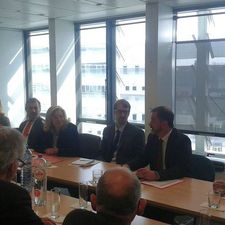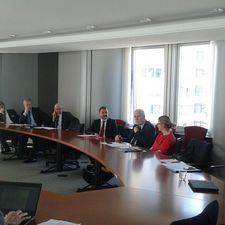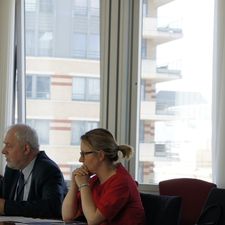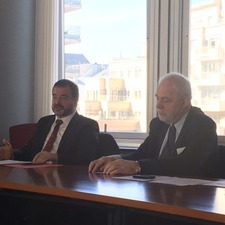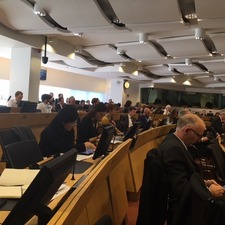The AMB calls on the European Union to make a more metropolitan commitment in its policies
| Subject: International Relations
80% of Europe's population will live in cities and metropolises in 2050
The Vice-president for International Relations and Cooperation of the AMB, Alfred Bosch, travelled to Brussels this week, where he held a series of meetings with various representatives of the European Commision, the European Parliament and the Committee of the Regions.
The main objective of this political mission was to raise awareness among the institutions of the European Union on the importance of metropolitan areas, to publicise the European Metropolitan Authorities (EMA) initiative, and to establish a dialogue on issues related to the Urban Agenda for the EU, all from a metropolitan perspective.
The Vice-president for International Relations and Cooperation of the AMB met the Commissioner for Regional and Urban Policy, Corina Cre?u, as well as a delegation of presidents, mayors and councillors from the metropolitan areas of Warsaw, Manchester, Turin, Toulouse, Porto, Oslo and Thessaloniki. They all defended the role of metropolitan areas in Europe, and called for European policies to take this territorial dimension into account. The delegation of metropolitan officials also conveyed the same message to the European Parliament, where they met the MEP responsible for urban issues, Jan Olbrycht.
In the afternoon, Alfred Bosch and the Vice-President of the Committee of the Regions, Karl-Heinz Lambertz, opened the Conference on ‘Metropolitan cities in the future cohesion policy'. Bosch called for the cohesion policy to allocate more funds to metropolitan areas and said that ‘metropolitan areas are the areas that generate the highest levels of wealth, competitiveness, employment, innovation and education, but are also the hardest hit by unemployment, poverty and problems with housing, mobility and air quality. Most of these issues must be covered from a supramunicipal perspective, and as such we believe that strong metropolitan governance is crucial for ensuring social cohesion and quality of life in the EU'.
Over 170 people attended the conference, at which the participants included representatives of the European institutions, the OECD and officials including the mayor of Greater Manchester, the president of the Porto Metropolitan Area, and vice-presidents and councillors of the Toulouse, Turin and Thessaloniki metropolitan areas. The vice-president of the AMB proposed that ‘during the next post-2020 period, cohesion policy must prioritise issues including air quality, sustainable mobility, natural heritage, innovation and competitiveness, unemployment and social exclusion, coexistence and the right to the city, governance and regional cooperation'.
He also presented the results of the study produced by the AMB on Management of EU structural funds in 14 metropolitan areas, which highlights the need for metropolitan areas to accept more responsibilities in the management of funds and to participate in their design and programming.
In the closing ceremony, in which the President of the region of Lombardy and member of the Committee of the Regions Raffaele Cattaneo also participated, Bosch announced that the next political meeting of European metropolitan areas (EMAs) will take place in Warsaw on 20 October this year. The EMA initiative began in Barcelona in 2015, and the second edition was held in the city of Turin in 2016.
During this mission, Bosch also held meetings with Amadeu Altafaj, Catalonia's permanent representative to the European Union, and the MEP Jordi Solé. Among other issues, they discussed the start of negotiations on the future cohesion policy of the EU, which currently allocates 35% of the EU's budget to European cities and regions.















































